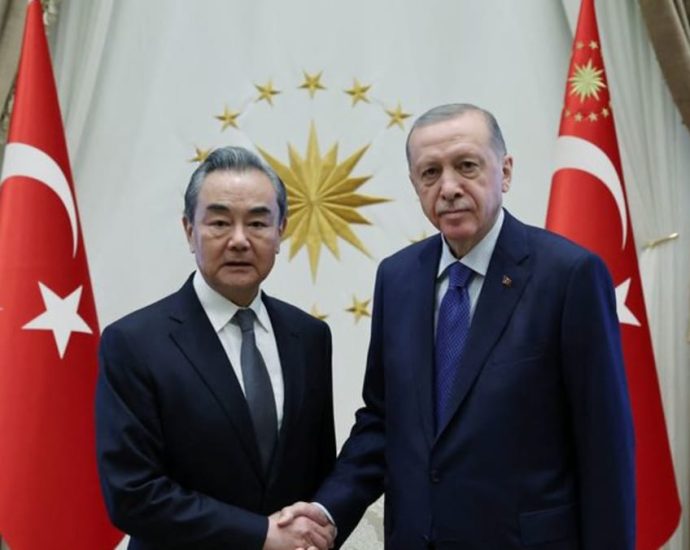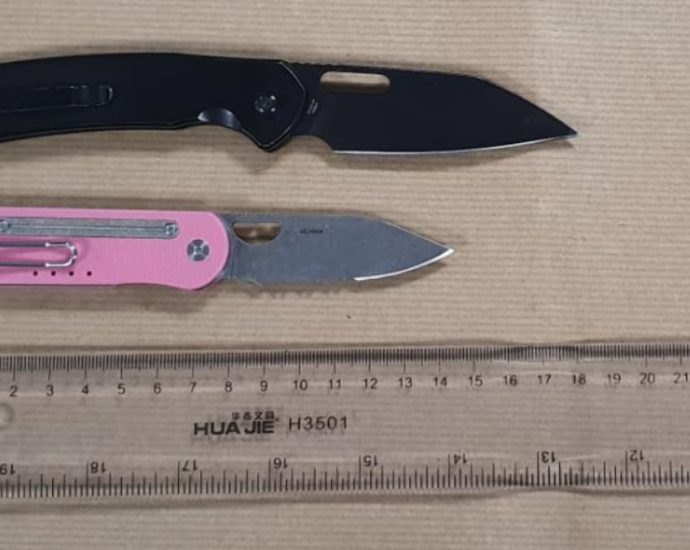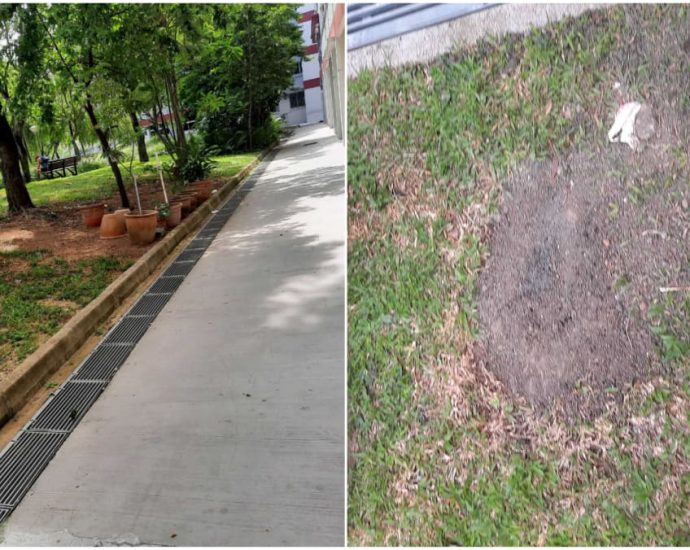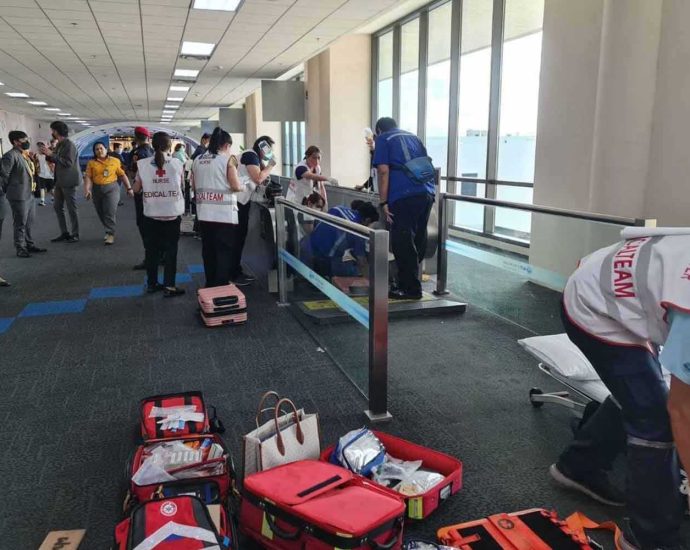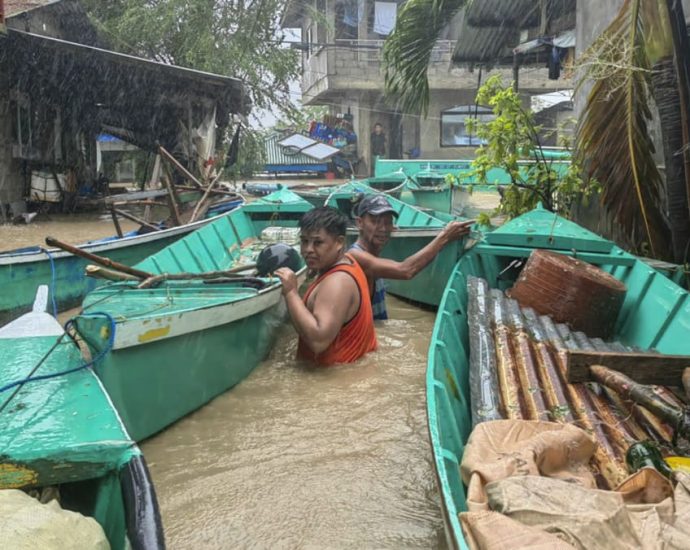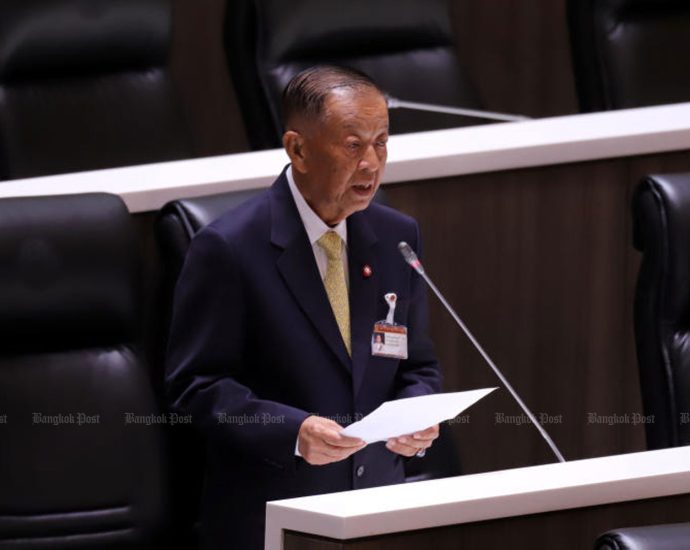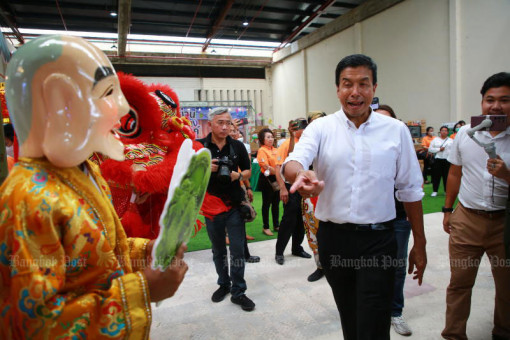AoT confirms faulty footplate caused walkway horror

PUBLISHED : 27 Jul 2023 at 04:00
Airports of Thailand (AoT) yesterday concluded that a collapsed plate on one of its moving walkways caused the accident in which a woman lost a leg at Don Mueang airport on June 29.
The probe was carried out by a nine-member fact-finding panel appointed by the AoT. It was closely monitored by two observers appointed by the victim’s family and two representatives from an insurance firm. It took 22 days to finish reviewing 10 items of physical evidence, as well as documents and statements given by 34 witnesses and other relevant individuals.
AoT director Kerati Kijmanawat said the accident was caused by a travellator footplate breaking free from the mounting frame, which led to the leg of the victim falling through the gap as she was approaching the end of the moving walkway.
Mr Kerati said the committee recommended hiring a technical expert from another agency to conduct safety checks on travellators at Don Mueang airport. The committee also recommended boosting safety measures so they are in line with EN115-2 standard, such as installing sensors to detect faults and CCTV cameras to check if maintenance is being conducted regularly and properly.
All the victim’s medical costs will be covered by the AoT, which will also offer her compensation, Mr Kerati said. He also conveyed his deep regrets saying that the AoT always prioritises safety.
New Chinese foreign minister Wang Yi talks Ukraine in Türkiye on first trip
ANKARA: Chinese Foreign Minister Wang Yi discussed Ukraine with his Turkish counterpart in Ankara and met President Recep Tayyip Erdogan on Wednesday during his first foreign trip since being appointed, a Turkish foreign ministry source said. China named Wang, a veteran diplomat, as its new foreign minister on Tuesday, removingContinue Reading
Man stabbed, slashed in Buangkok; two male suspects arrested
SINGAPORE: Two men have been arrested after allegedly attacking a 48-year-old man, leaving him with injuries including stab wounds and a slash to his face. In a news release on Wednesday (Jul 26), police said they were alerted to a case of assault along Buangkok Crescent on Monday at aboutContinue Reading
Rat holes in Pasir Ris covered up after residents complain of ‘scary’ rodent situation
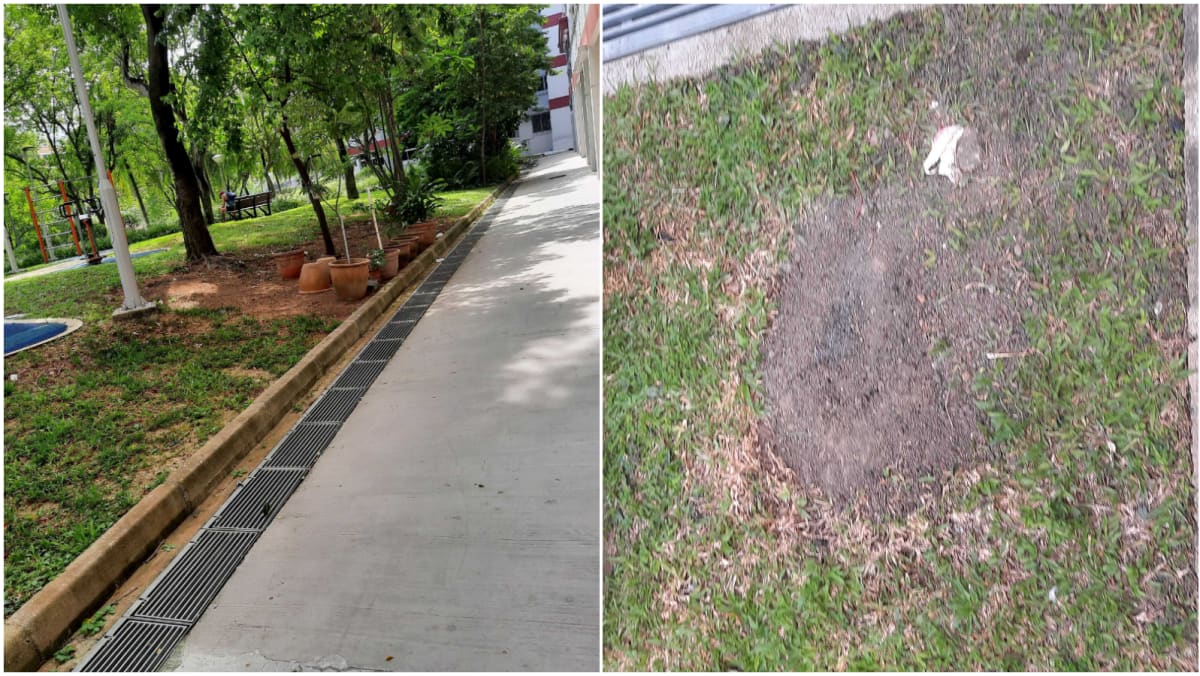
“GRANDFATHER OF ALL RATS”
Most residents CNA spoke to said areas where the rats appeared were clean and that estate cleaners were doing a good job.
Ms Angela Sabapathy said she used to see rats under block 273 and near the rubbish chute, when renovation works were ongoing at the ground floor from late last year to a few months ago.
“That area was a problem. And they’re gutter rats so they’re quite big,” the 66-year-old retiree said.
“The one I saw was the grandfather of all rats … It was scary.”
Apart from the size of the rats, their boldness – appearing in daylight and near humans – was also a concern, Ms Angela said.
“We are not a slum … But the fact that you see a rat running around, scurrying, and not at all afraid of you – they are too familiar already.”
Mr Tan suggested that the pest problem might be exacerbated as more people start to dump their trash directly into chutes instead of bagging them up, in a bid to avoid using plastic bags.
Large supermarket operators began imposing a plastic bag charge earlier this month.
“In the future more and more people will just throw it through here … the rats and cockroaches are happy that the food is there. I think this is another issue coming up,” he said.
The town council spokesperson said rodent control measures in the area have been enhanced under a Rat Attack Programme.
“This includes area-specific burrow treatment plan, implementing comprehensive bait and trap measures, building modifications to prevent further habitat from forming, intensified night culling methods and other long term control measures,” the spokesperson said.
He added that Pasir Ris-Punggol Town Council has also been working with the Resident’s Network community to educate and spread awareness to residents to continue to maintain an environment that does not actively sustain rodents with food and habitat resources.
“We will continue to intensify the rodent control measures until the rodent population and burrows are eradicated.”
CNA Explains: How prevalent is nose cancer in Singapore?
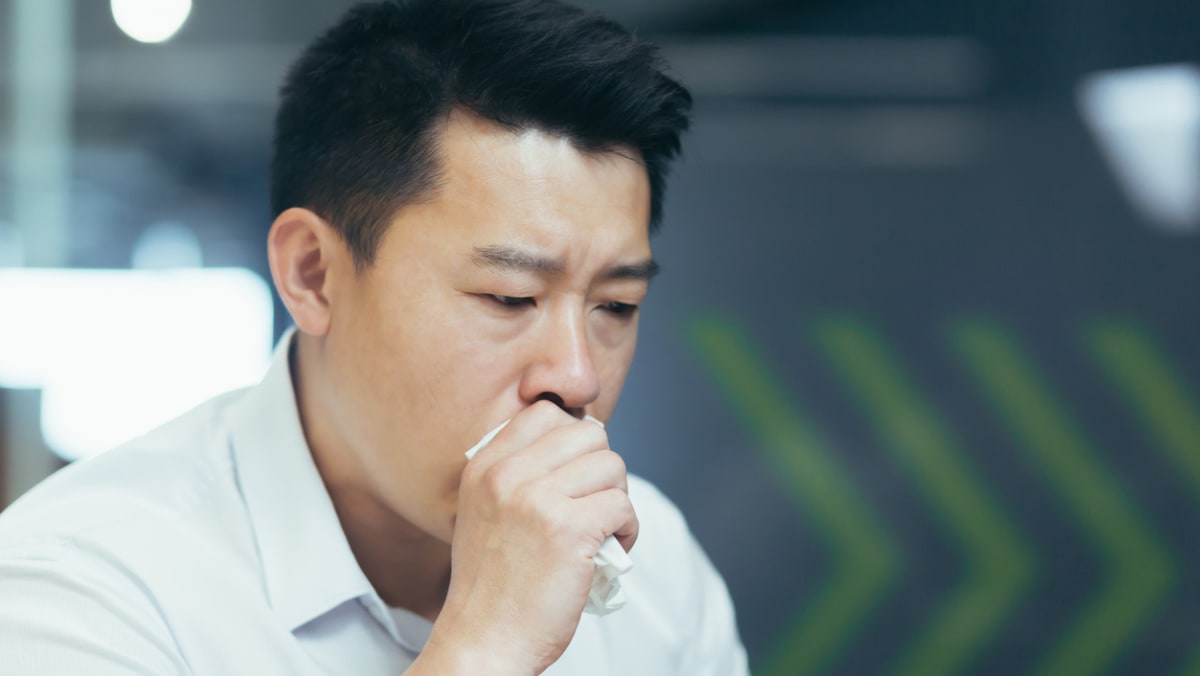
According to the Singapore Cancer Registry’s 2020 report, it is the second most common cancer for men aged 40 to 49, and the third most common cancer for men aged 30 to 39. It is the ninth most frequent cause of male cancer deaths.
Besides having a higher incidence among men, nose cancer has a genetic predisposition to the southern Chinese ethnicity, said Dr Eu.
According to the Singapore Cancer Society, nose cancer is also associated with the consumption of salted soy beans, vegetables, fish and meat. The cooking of these preserved foods release fumes that contain nitrosamines, which are considered carcinogenic.
SYMPTOMS AND DETECTION
In the early stages, nose cancer may have no to minimal symptoms, said Dr Tan Chee Seng, senior medical oncologist at OncoCare Cancer Centre.
Early signs include nose bleeding, headaches, the sensation of blocked ears, nasal blockages and blood-stained phlegm.
As the disease progresses, patients may experience neck lumps and double vision. In more advanced stages, the cancer may spread to the bones and lungs, causing pain and breathing difficulty.
“The difficulty with nose cancer is that it is particularly silent in its onset,” said Dr Eu, pointing out how Mr Liang, the MP, had the “fairly innocuous” symptom of muffled hearing.
After 38 years, Cambodia PM Hun Sen to hand office to son
After nearly four decades in power, Cambodia’s Prime Minister Hun Sen has put in his resignation notice.
Just two days after Cambodians cast their ballots in a general election dominated by his party and condemned by the West as neither free nor fair, the long-standing leader announced on state television that he would pass his office to his eldest son, Hun Manet, on 22 August.
Hun Sen will remain the head of the ruling Cambodian People’s Party (CPP) and will stay in the new government as president of the Senate, a posting he’ll take in February.
“It is the country’s plan to maintain long-term stability – such stability and peace is the foundation of development,” the prime minister said in the nearly hour-long televised address. “It is an assurance that when a new generation takes power, the old generation stands beside him.”
The CPP has long managed to keep its inner workings opaque, and though rumours of rifts still occasionally swirl beyond its ranks, the party today generally presents a united public face. After Hun Sen publicly announced in December 2021 his wish to hand power to his son, within nearly a week top party leaders – along with authorities from officially nonpartisan institutions such as the judiciary and military – had rushed to endorse Manet as a future prime minister candidate, swallowing whatever ambitions or reservations they may have had.
“I am the one who makes the biggest sacrifice.”
Prime Minister Hun Sen
From there, last weekend’s ballot represents not only the image of a people’s mandate for dynastic rule, but also a means of cementing a son’s inheritance – a system of near-total state power largely accountable only to itself and tightly consolidated around a single family and its patriarch.
The breakdown of the party’s historic factions to make way for such a personalised model of rule has been decades in the making by its architect Hun Sen, an ex-soldier who backed his will to power with a battlefield view toward governance.
Through years of careful brokering, the prime minister has knit a tightly woven ruling elite using a mix of patronage politics and outright violence waged on a scale both petty and grand. In the past five years alone, the prime minister has made dramatic gains in societal control after the Supreme Court, led by a top member of the CPP, ordered the dissolution of the popular opposition Cambodian National Rescue Party (CNRP) ahead of the previous national elections of 2018. That ruling gave way to the mass trials of former CNRP members and supporters for crimes ranging from incitement to treason.
After his son takes the top office, Hun Sen will undoubtedly keep an unwavering eye on the careful balance of interests that have made possible his vision of rule. Even with his father’s continued influence, Manet may find the weight of this amassed power to be a heavy burden to shoulder.
“I am the one who makes the biggest sacrifice,” Hun Sen told Chinese state media before the election. “Right now, I have an absolute power, but in about a month, I won’t have the power to sign any bills the same way as I do today.”
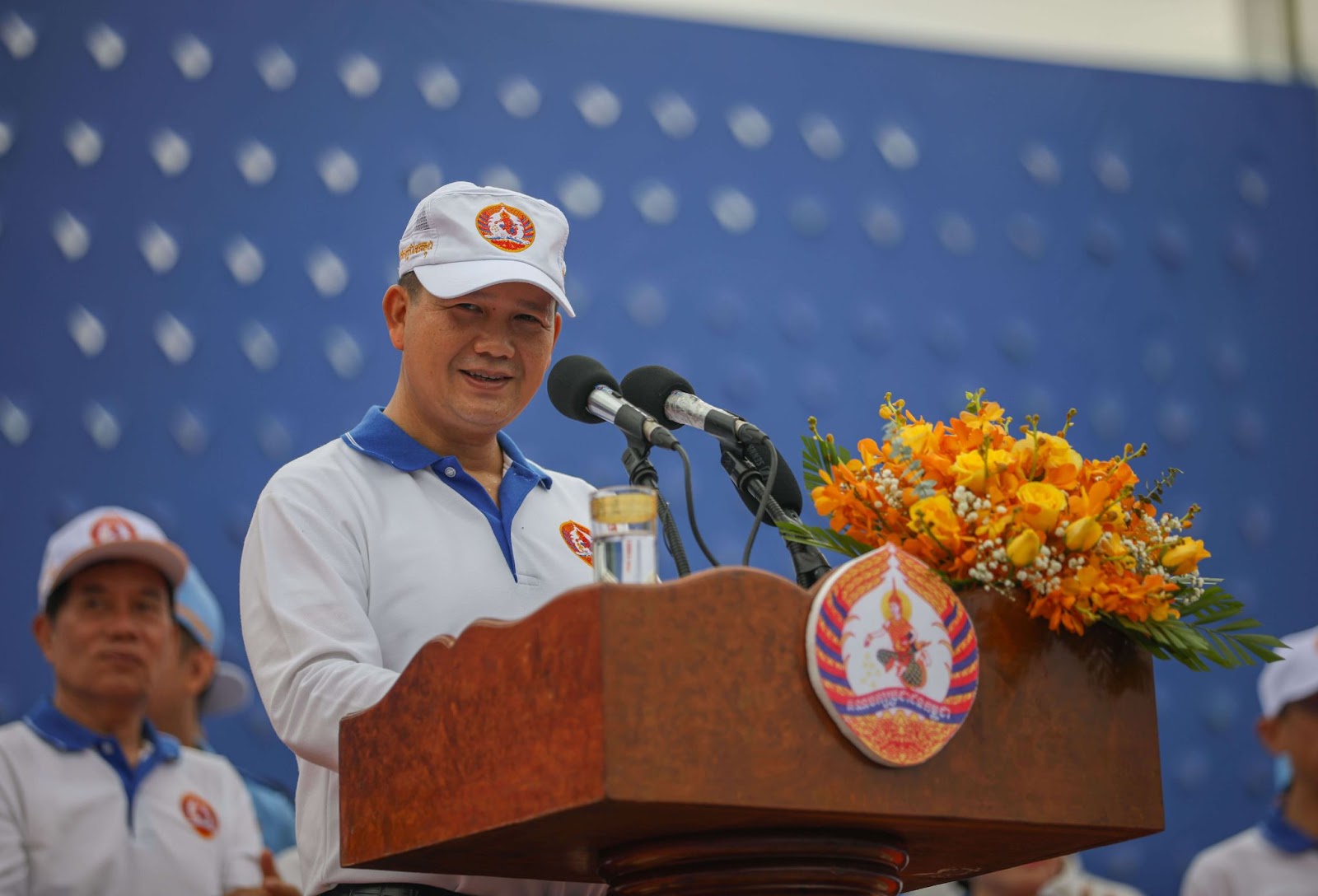
Over the past year, Manet, a military commander, has represented the state in various functions both domestically and abroad. Last week, he headlined the CPP’s closing rally of the official campaign period, speaking to party supporters before leading a massive motorcade through the capital Phnom Penh.
Despite its nearly exclusive historic control of all state mechanisms, the ruling party still handled Sunday’s national election as a critical juncture of a larger generational turnover within the CPP characterised in large part by nepotistic power transfers.
In May, the National Election Committee rejected the country’s most popular political opposition – the Candlelight Party, a reconstituted version of the CNRP – over an alleged paperwork issue. With no serious opposition, the ruling party declared a “landslide” victory, claiming 120 of the 125 seats in the National Assembly. An analysis of the candidate list by the media outlet CamboJA found that 22.4% of CPP candidates are familial relatives.
The remaining five seats will go to Funcinpec, a royalist party. The organisation has deep roots – it won Cambodia’s UN-administered election of 1993, defeating the CPP, but was later toppled in a brutal 1997 clash orchestrated by Hun Sen.
That first modern election served as the capstone of the unprecedented scope of the UN Transitional Authority of Cambodia, which ostensibly provided a framework to end the country’s long-boiling conflict with a shift to liberal democracy.
By the time the UN rolled in with more than 20,000 personnel and $1.6 billion in eventual spending, Hun Sen had already been prime minister of a single-party state since 1985.
A former Khmer Rouge cadre who defected early to Vietnam, he’d returned home in the 1979 Vietnamese invasion that swiftly crushed the communist government of Democratic Kampuchea and established a new, socialist government. Hun Sen rose through the ranks in Phnom Penh under Vietnam’s decade-long occupation and, upon its military withdrawal, took over the fight against the remaining Khmer Rouge insurgency.
Before the elections of 1993, geopolitical wrangling had left his government unrecognised by the international community. Cambodia’s seat at the UN was filled by a representative of a tripartite government-in-exile that included royalists, the Khmer Rouge and anti-communist Khmer nationalists avowed to end the Vietnamese occupation.
This unlikely alliance was led by the late King Norodom Sihanouk, a deeply influential figure of modern Cambodian history who lent his legitimacy to its cause.
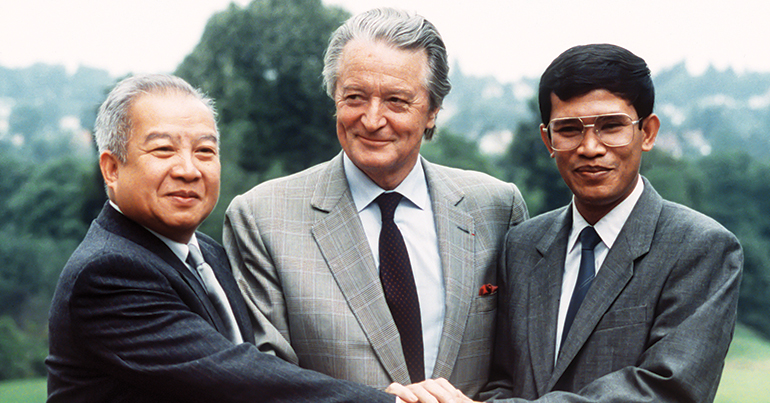
The years of international isolation had already chafed Hun Sen. So by 1993, when the royalist victory at the polls threatened to sideline the embattled prime minister, he promptly forced a power-sharing agreement that all but undid the results of the ballot. Hun Sen and Funcinpec party leader Prince Norodom Ranariddh, son of the former king, ruled as co-prime-ministers until the clash of 1997 put a decisive end to that.
In a recollection of the 1997 conflict published after its 10-year-anniversary, former UN rights worker Brad Adams described the short-lived fighting between the armed wings of the CPP and Funcinpec.
“Even without the support of much of his party, Hun Sen was able to put together enough military power to succeed,” wrote Adams, who was by then the Asia director of Human Rights Watch. “He then unleashed his forces to carry out a campaign of extrajudicial executions, primarily of FUNCINPEC military officers. I and many of my colleagues at the UN human rights office had the unforgettable experience of digging up the bodies of men stripped naked to their underwear, handcuffed behind their backs, blindfolded, and shot in the head.”
To the victor go the spoils.”
Brad Adams, former Human Rights Watch Asia director
Speaking to the Globe shortly before the election, Adams believed the 1997 conflict was the key turning point for the eventual consolidation of Hun Sen’s power over both party and country. Though rival factions within the CPP may have once posed a real threat to his leadership, his triumph over Funcinpec and his co-prime-minister Ranariddh – who died in 2021, passing Funcinpec’s leadership to his own son, Prince Norodom Chakravuth – secured his status at the top.
“To the victor go the spoils,” Adams said. “He basically took control of the police, the military and the gendarmerie after the coup, and he hasn’t looked back.”
Though armed conflict akin to that in 1997 has yet to resurface in Cambodia, a steady current of unresolved street attacks on opposition members ahead of this year’s election managed to keep the old militaristic spirit alive. Still, in comparison with Funcinpec’s earlier beheading and the legalistic blitzkrieg unleashed against the CNRP, this year’s rejection of Candlelight was practically hushed.
“There’s never been a time when there haven’t been laws in the books that could be used this way, so the lawfare succeeded there as a result of years and years of violence and intimidation,” Adams said. “People have made a calculation this time around that the cost-benefit of publicly opposing this is not great because there’s almost no chance of a benefit.”
Within this mathematics of power, Manet is an untested variable. In a political system where blood ties are the ultimate bond, it remains to be seen exactly how much of his father’s legacy he will inherit.
âCollapsed plateâ caused Don Mueang walkway accident
Airport operator to hire third party to check all parts in response to accident in which woman lost leg
PUBLISHED : 26 Jul 2023 at 20:24

Airports of Thailand Plc (AOT) has concluded that a collapsed plate on a moving walkway caused a woman to fall and her leg to be severed at Don Mueang airport last month.
AOT president Kerati Kijmanawat said on Wednesday that investigation found that the moving walkway between Gates 4 and 5 of the second domestic terminal had a problem when one of its metal plates became detached from its frame, creating an opening.
Consequently a traveller fell into the mechanism and was seriously injured, said Mr Kerati, referring to the incident that happened at 8.21am on June 29. The victim was a 57-year-old woman who was about to board a flight to the southern province of Nakhon Si Thammarat.
The woman had to endure an emergency amputation of her left leg above the knee by medical personnel at the scene before being rushed to the nearby Bhumibol Adulyadej Hospital where her condition was stabilised.
She was later taken to Bumrungrad Hospital for further surgery and treatment. Her family later said they would file a complaint with police against the airport operator.
All 20 moving walkways at Don Mueang were suspended from service pending inspections and necessary upgrades.
The investigation into the accident was carried out by a committee including representatives from AOT, the Ministry of Transport, the Engineering Institute of Thailand, the Council of Engineers and an independent academic.
Mr Kerati apologised for the incident and promised AOT would cover the woman’s treatment costs and give her the best compensation.
He said that AOT would hire a third party to check all parts of all moving walkways at Don Mueang airport and also evaluate the maintenance standards of airport staff. It also intends to install sensors to detect any defects in plates on moving walkways.
Twenty moving walkways at Don Mueang airport were installed by Hitachi Co of Japan in 1996 and its certified local dealer, Siam Hitachi, has maintained them regularly ever since, airport management said earlier.
In a related development, the AOT board on Wednesday approved the transfer of Don Mueang general manager Karant Thanakuljeerapat to AOT as an adviser, effective from Oct 1. He will be succeeded by Vijit Kaewsaitiam, the current director of Chiang Mai airport.
Two dead as typhoon Doksuri batters Philippines
Widespread flooding and power cuts were reported in the north of Luzon, while landslides blocked key arteries in its mountainous interior. About 1,500 people were also evacuated from coastal communities in neighbouring Isabela, Foronda said. “We won’t allow them to go home until we get the all clear from theContinue Reading
Speaker warns MPs not to become âcobrasâ
People who betray their parties rarely make it back at the next election, says Wan
PUBLISHED : 26 Jul 2023 at 20:10

House speaker Wan Muhamad Noor Matha has warned MPs against betraying the trust of the people by turning into “cobras” in parliament.
Mr Wan, who is also the Parliament president, told a recent seminar on the roles and duties of MPs that the real power belongs to the people and is exercised through their elected representatives.
“It’s a mistake to think that the electorate are mere holders of voting rights. That’s a total misconception of the democratic principle,” he said.
MPs who regularly consult their constituents rarely go wrong in performing their duty as lawmakers, Mr Wan noted.
The seminar was the first induction held on the lawmakers’ roles for MPs elected in the May 14 general election.
Mr Wan added that the MPs should stay focused and dedicate themselves to their parliamentary work and not lose interest in attending House meetings.
The House speaker said some MPs were not re-elected after they had allowed themselves to turn into “cobras”.
This was a reference to those who were bankrolled to vote in parliament in defiance of their respective parties’ stances.
“Throughout the years I’ve been an MP, I have yet to see a single ‘cobra’ make it back into parliament. Take the tale of the 40 ‘cobra’ MPs as an example,” he said.
Mr Wan is understood to have been referring to the alleged collusion to purge Prime Minister Prayut Chan-o-cha through censure votes in 2021.
The plot to stage a revolt had taken place days prior to the no-confidence debate. Gen Prayut was the prime target of the debate that centred largely on the government’s failures to manage the Covid-19 situation and corruption.
The revolt initially drew around 40 MPs who reportedly included some from the ruling Palang Pracharath Party itself, although Gen Prayut’s supporters in the coalition managed to convince more than half of the MPs to backtrack.
Gen Prayut eventually managed to survive the censure motion.
Mr Wan, who quit as Prachachat Party leader to become House speaker, said MPs must be receptive to changes in society and adjust accordingly.
Chadchart addresses uproar over âLittle Chinaâ
Bangkok governor calls for checks in Huai Khwang following Chinese expat’s video
PUBLISHED : 26 Jul 2023 at 20:03

Bangkok governor Chadchart Sittipunt has ordered the Huai Khwang district chief to strictly enforce laws and regulations on Chinese-funded businesses in the district.
The order on Wednesday came after a recent video on TikTok by a Chinese expat who posted a review about living in Thailand.
He started the video by saying that he could easily live in the country, even though he could not speak any Thai.
The video showed a day in his life, noting that he relied mostly on Chinese restaurants and supermarkets, both in the Huai Khwang area, as well as using Chinese-based delivery applications to order food. The delivery driver was also seen speaking Chinese fluently.
The video sparked criticism among Thai netizens, with some mockingly calling the area “Monthon Tai Guo (Thailand Province of China)”.
Some were concerned about the area being converted into “Little China” and being dominated by Chinese-funded businesses.
Mr Chadchart said these businesses can help stimulate the economy. But he also wanted to ensure these Chinese-funded businesses to strictly follow laws and regulations, adding that some operating in the Huai Khwang area had been closed by City Hall for violating the Food Act regarding imported food.
He said he had ordered the district office to keep an eye on Chinese-funded businesses, especially restaurants and illegal businesses.
City Hall cannot interfere with their business registrations, however, as they are the responsibility of the Ministry of Commerce, he said.
In any case, he said, all will be inspected, especially food and drink businesses, to make sure they follow the Public Health Act.
Chinese-funded businesses can be considered quality competitors, but they must respect consumers’ safety, Mr Chadchart said.
He also talked about the current tourism trend in Bangkok after episodes of foreign television series were broadcast recently featuring local restaurants and attractions.
As many foreign creators shot their content in Thailand, especially in Bangkok, Mr Chadchart said this is a golden opportunity to promote tourism and persuade more foreigners to visit the country.


